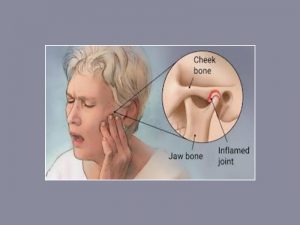TMJ Disorders
Pain in the jaw and noticeable limitations in jaw movements can be a sign of any of the Temporomandibular Joint Disorders (TMJ or TMD). As with other joints in the body, TMJ is also affected by injury and conditions such as arthritis. One or both joints may be affected in people with TMD, which can affect a person’s ability to speak, eat, chew, swallow, make facial expressions, and even breathe.
Clenching or grinding your teeth, tightening your jaw muscles and stressing your TM joint can lead to TMJ disorders. It can also be a result of having a damaged jaw joint due to an injury or disease. Whatever the cause, the results may include a misaligned bite, pain, clicking, or grating noises when you open your mouth, or experience difficulty in opening your mouth wide.
More than 90% of TMD is muscle problems which can cause headaches and other types of pain in the jaw area. The reason for this muscle problem comes from the biting action or problems with the movement of the lower jaw.
Temporomandibular Joint Disorders

